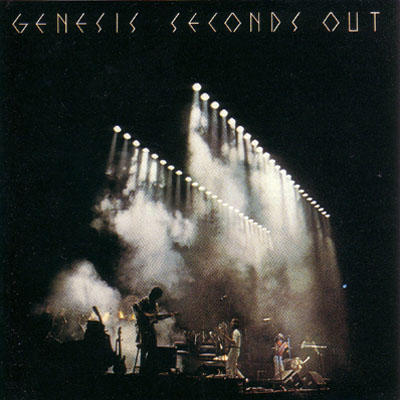
Seconds Out (1977)

Disc One:
1.Squonk
2.The Carpet Crawl
3.Robbery, Assault & Battery
4.Afterglow
5.Firth of Fifth
6.I Know What I Like
7.The Lamb Lies Down on Broadway
8.The Musical Box (Closing Section)
Disc Two:
9.Supper's Ready
10.The Cinema Show
11.Dance on a Volcano
12.Los Endos
By the time Seconds Out was released in 1977, Genesis had undergone what many assumed would be a terminal transformation. Peter Gabriel—costumed poet, frontman extraordinaire, and, in the eyes of many, the band’s narrative soul—had exited the stage. And yet, remarkably, Genesis not only survived this loss but began to consolidate its identity around new frontman Phil Collins. This double live album, recorded across several dates in Paris, is the first full document of that post-Gabriel lineup performing Gabriel-era material on a grand scale—and it succeeds in ways that few anticipated.
For those coming to Genesis in the early 1980s—by way of Abacab, say, or Duke—Seconds Out might have seemed something of a relic, a window into an earlier, more elaborately cloaked incarnation of the band. But for many listeners, this album was their gateway into the vast Genesis back catalogue. Lacking a traditional “greatest hits” package (they hadn’t had any hits to collect), Seconds Out functioned as a kind of retrospective sampler—an expansive, expertly executed survey of the band’s most theatrical period.
Unlike their earlier live effort (Genesis Live, 1973), which had the feel of a scrappy performance in an intimate theatre, Seconds Out reflects a band that had made the leap to arena-scale presentation. The performances are polished, expansive, and confidently delivered. The material—culled from Foxtrot, Selling England by the Pound, The Lamb Lies Down on Broadway, and their two most recent Gabriel-less studio albums—is rendered with near studio precision, though with enough live energy to lift it well beyond reproduction.
The complaint, occasionally voiced by less-than-perceptive critics, that the renditions here “sound too much like the studio versions” misses the point entirely. These performances are not carbon copies—they are faithful, yes, but invigorated by the grandeur of the live setting and the addition of a second drummer. Chester Thompson, brought in to handle the kit when Collins assumed lead vocal duties, proves a revelation. Where some earlier experiments with live percussion support (notably the inclusion of Bill Bruford during the Trick of the Tail tour) felt uncertain, Thompson blends seamlessly into the fabric, locking in with Collins during the many twin-drum sections. In fact, the rhythmic drive achieved here—especially during pieces like Cinema Show or Los Endos—rivals anything in their studio work.
The track listing is both generous and judicious. The Musical Box reappears (albeit only its climactic finale), while Supper’s Ready finally receives its due, taking up the entirety of side three. Other highlights include a thunderous Firth of Fifth, a tense, elongated Dance on a Volcano, and a gloriously cinematic Afterglow to close. Throughout, Tony Banks’s keyboard textures remain central—he now essentially defines the Genesis sound—while Steve Hackett’s guitar lines retain their lyrical clarity, this being his final recorded appearance with the group.
Seconds Out also marks a shift in the band’s stage presence. Gone are the theatrical personae and costume changes of the Gabriel era. In their place is a band of musicians’ musicians—competent, serious, and entirely absorbed in the act of playing. If there is a new spectacle here, it is percussive: Collins, forever the reluctant frontman, cannot resist returning to the drum kit at every opportunity, and the interplay between him and Thompson becomes a defining feature of Genesis’s live identity for decades to come.
There are moments, perhaps, where one senses the length creeping in. With nearly 100 minutes of material, not every track may sound like it achieves transcendence. Yet as a document of a band redefining itself in real time, Seconds Out remains essential. It is both an end and a beginning—the closing chapter of Hackett’s tenure, and the first confident stride of Genesis Mark II.
For a group so often associated with studio craft and elaborate narratives, this album affirms what long-time fans always knew: Genesis were, above all, an exceptional live band.
Go back to the main page
Go To Next Review